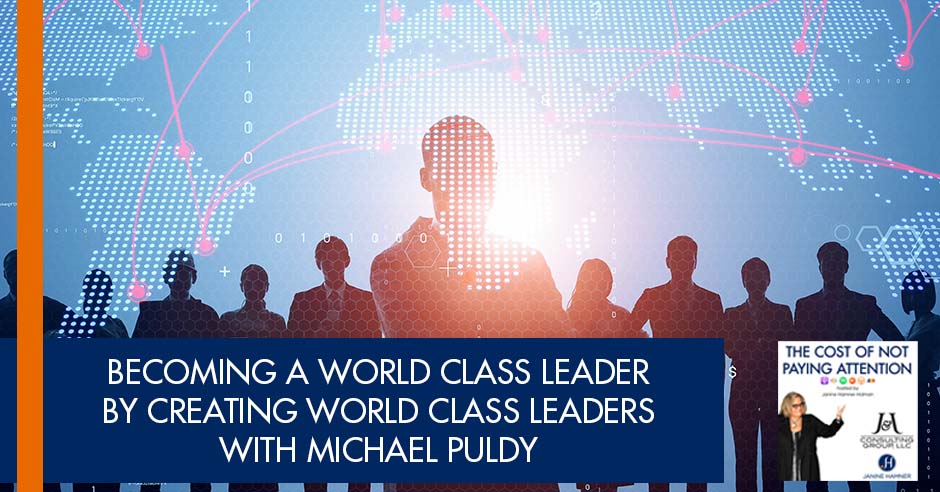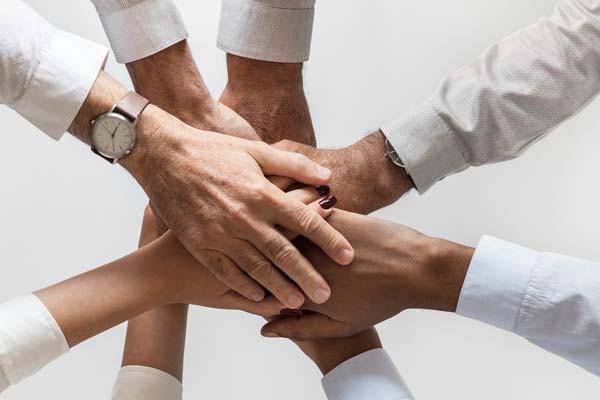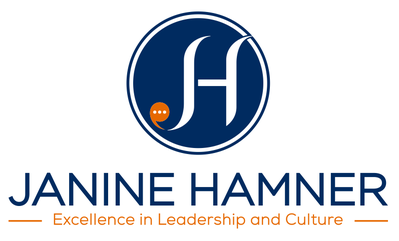
In order to be a world-class leader, you have to be able to create world-class leaders. You need to recognize the capabilities of the people in your business. When crises come for you, you will have to take a step back and let your team do the work. You have to make sure that your business can run without you. Give your people opportunities so they can grow and expand. Join Janine Hamner Holman as she speaks with Michael Puldy about letting others step into leadership. Michael is the CEO/Managing Partner of Puldy Resiliency Partners, which focuses on ways companies can protect themselves against internal and external threats. He is also an author and the host of the Risk Stories! podcast. Learn more about risk management and how you can better secure yourself online. Discover the crisis he had to deal with which changed his perspective on leadership forever. Start creating the leaders of tomorrow today!
GUEST: Michael Puldy | LinkedIn | Visit their Website: Puldy Resiliency Partners
HOST: Janine Hamner Holman | [email protected] | LinkedIn, Facebook, Instagram, and Twitter |
—
Listen to the podcast here
Becoming A World Class Leader By Creating World Class Leaders with Michael Puldy
What am I paying attention to now? The idea of resiliency. This is a word that has been coming up a lot, especially in the last couple of years with COVID. It was a word that was in my world before that although, it used to live how I think of grit, digging in, getting it done, and doing the hard work.
As my relationship with the word resiliency has evolved, I realized that it is more about recovery. There’s been so much talk about resiliency in the last couple of years in particular with the Great Resignation, organizations looking at how are we organized and how are we doing what we’re doing, and managers taking another look at how do I get the best and the most from my people? How do I have them be the most engaged?
There are challenges and bumps in the road all the time. I think it’s not so much about how to get through it or persevere. It’s more about how we recover. How do we come back to ourselves? When we fall down, there’s a challenge and a speed bump, how do we recover ourselves? In the midst of all of the work that we’re doing and the things that we’ve got going on, how do we build time into that for recovery?
I started thinking about this whole idea of resilience thanks to our guest. Michael Puldy is the CEO of Puldy Resiliency Partners, where Michael guides business leaders to reduce their business risk and respond to crises all while protecting their brand, their employees, and their clients. Michael has many years of technology, information risk management, and operation experience, including over two decades in leadership roles at IBM. In Michael’s last assignment at IBM, he led their global business continuity response to the COVID-19 pandemic. Michael is also an award-winning speaker and author of professional and peer-reviewed papers, blogs, and the host of the Risk Stories! Podcast and has published three books.
—
Michael, welcome to the show!
Janine, thanks for having me.
You are very welcome. I’m thrilled to have you here with us. Michael, tell me, what is something that you have become aware of that people are not paying attention to either consciously or unconsciously? What’s the cost of that inattention?
Let me provide a couple of different responses to that. First of all, from a personal and a human relations point of view, what I’m finding more is how few people get on video when they are on Zoom. They will be invited to a Zoom session, whether it’s a meeting with three people or 100 people. I’m amazed at how few individuals will turn on their video. Many times, I’m the only person who has their video running and people comment, “That’s a neat background you have.”
For people on the show who obviously can’t see us, I have a stack of a vertical stack of books that is 6 feet 10 inches high. It’s such a great way to connect with people and have a personal experience when you can see who you’re talking to. Many people miss that opportunity. I think that’s a great loss how so many people on one side are saying, “I’m at home. I don’t feel connected with the people with whom I work or speak.” They’re not willing to present themselves and open up that connection. I find that a sometimes, if I have my video on, there will be a few people who will turn theirs on.
They are turning theirs on because you have turned it on or compelled them or because they see you. They might think, “I like being able to see his face, so I’m going to turn mine on too.”
Now that’s from the personal connection point of view. From a professional resiliency point of view that we’ve talked about and you opened the show with, quite frankly, I live in pretty much every day of my life, both personally and professionally, I see so much exposure. I see many organizations, business owners, business leaders, and people with families neglect to protect themselves and those around them. I’ll give you a simple example.
People have their phones. They expect that those phones are backed up but the reality is most of those phones don’t have the settings properly configured. Their phones will back up correctly and no one checks. I’m at lunch with a friend of mine and he goes, “I lost my phone. I can’t get my data back.” He hands me the phone and asks, “What’s wrong?” I look at it and tell him, “Your setting is wrong. You haven’t been backing up.”
What are we supposed to do? I picked up my phone because I’ve got so much stuff. I’ve got, not only the emails, which are also on my computer but many photographs, videos, and notes.
We’ll do a quick tech support tutorial for those of you who are running iPhones. If you go to settings and at the very top, you’ll see your name and it’ll say Apple ID and Cloud. Push that then scroll down about halfway. You’ll see something that says iCloud, push that button. Where it says manage storage and below that, you’ll see it says photos and iCloud backup and keychain, turn on anything you want to back up. If you want your photos backed up, you hit that and it brings up the settings for our iCloud photos. You turn that on then you go to iCloud backup and you turn that on.
Keychain is all your passwords. If you put your passwords on your phone, Apple says, “Would you like us to save your password?” Security people will say, “That’s not a good idea,” but most people do it, so back it up. Most of your passwords have been compromised anyway, so change them regularly and you’ll be fine. You go through that list and you’ll see contacts, calendars, notes, and messages. Go down the list and decide what you want back up.
When you're talking to people, you have to be present, whether you're talking from thousands of miles away or in a coffee shop. Share on XWhat if somebody is not on an Apple phone?
Everyone is either on an iPhone or an Android platform. I’m not an Android user, so I can’t tell you the exact spot but it’s a similar process. You need to go on that system and identify where the backup settings are and back it up. Another option is you could back it up to your computer but that’s for another day. The reality is if you think about it, that simple example we went through, many people think it happens automatically.
They don’t have to do anything. The good news is, for the most part, people don’t have to do a lot of things but you have to be present like the example of showing yourself on video conferencing. You have to be present when you’re talking to other people, whether you’re thousands of miles away or you’re in a coffee shop. It’s the same thing with your technology and your business, you have to be present and you have to ask the right questions to make sure that people are doing their jobs or the technology is doing what you expect it to do.
A common phrase I like to use, one that I am not able to take credit for, is “Backup is easy, recovery is hard.” Going through those simple steps of pushing a few buttons so your phone can back up to its heart’s content into the cloud is great. If you lose your phone, the next question is, “How do I recover?” For Applie users, the good news is that Apple makes it easy to recover off the cloud. You have to enter your passwords and it comes down.
If you’re running a small business and your IT or QuickBooks is in the cloud, that protects you only so far. In some cases, it’s 100%. You’re all set because the organization takes their own backups and they test those backups. They make sure it works and there’s a contract. They give you a report once every six months or once a year that says, “We’ve tested and it works. It’s great.”
Large companies don’t do that. They don’t test their recovery. Go to your accountant and ask them, “When was the last time that you had a security vulnerability scan or you simulated what you would do if your business was hit by ransomware and my data was stolen? When was the last time you simulated that activity?” You will get some pretty blank stares or they would say something to the effect of, “We have a cybersecurity company who does that or we have an IT company that does that.”
The next question would be, “Have you reviewed the contract to understand what they’re responsible for? Have you tested them or have you had them come over and spend an hour with you to explain what they did?” Do it in business terms versus the techno-magic hocus pocus the tech people like to use with the unsuspecting lawyer, doctor, or independent consultants.
I will take my car to a shop or the dealership or wherever it is I’m taking it depending upon what needs to be done. They will say all these words to me, many of which I don’t understand. I was speaking with a client and I kept laughing about how many acronyms there are in their business and in their industry. I spent almost a decade in the trash and recycling world. There are so many acronyms in that world.
When we’re immersed in a world, we get used to that language and we forget how to speak normal people English in a way that somebody can understand it. It’s important for folks to speak in a way that consumers can understand what they’re talking about. When we’re talking with an IT professional, they need to be encouraged to speak in a language that we can understand what they’re saying. Sometimes I say to my accountant, “I don’t know what we’re talking about anymore. I need some more words or different words.”
I used to work for a great manager who became a great friend. When we would have internal presentations or discussions and people would use acronyms or they would place the acronym on the chart, he was meticulous about having them spell it out. Don’t use the term ADC. It’s an Auxiliary Data Controller, but spell it out so no one has to interpret it because sometimes some of these acronyms could be have different meanings.
That was a learning experience. Again, bringing it back to the IT discussion of the business conversation, too many times people are not understanding what’s the backup plan, recovery plan, or they’re focused on the technology of it. What happens when we get hit by ransomware? “I’ve got an IT person. They’ll recover our data.”

World Class Leaders: Very few people go on video when they’re in a Zoom meeting. Personal connection is much stronger when you can see who you’re talking to.
What happens if the data is not available? “I call the security person.” The security people are responsible for fixing your security or getting your network up. They’re not responsible for recovering your data. “Who talks to the client?” “I guess that would be me.” “What are you going to tell that client when their personal and private information is now on some dark web somewhere in the middle of nowhere and their credit cards and their passwords are now being exploited? What are you going to tell them?” “I don’t know.” “Do you have an attorney lined up?” I have my cousin Joe, who’s a Family Law attorney.” Unfortunately, that’s not going to help you when the State Department or the Department of Justice calls you and wonders why you’ve given $10,000 of ransomware money to a terrorist organization which, by the way, is against the law. You may be fined or have to go to jail.
Lots of folks who are reading this have businesses and work for companies where we take people’s personal information and might accept credit cards or we end up having people’s data. What are the ways in which we should be paying attention or we should be making sure that people’s information is protected, whether it’s our information or somebody else’s information?
First of all, know who your experts are and understand where you are vulnerable in your environment. It’s always good to have either your own resident expert or an outside expert. Have someone come in and let you know where your risks are to your business. Is your risk in your people because they’re not properly trained? Do you have security training once a month, once a quarter, or once a year? Do you have policies, so people understand how to keep passwords set up?
For example, how you should construct your business or how your gaps are with what you’re currently doing with the BMP (Best Management Practices). That’s one thing. The second item is what’s important. Rank your business processes. What are the most important parts of your business? Do you have any eBusiness where you’ve got a website where you’re taking money? Is your business dependent on the phone? People calling in and asking questions or scheduling meetings. Do you have a meeting scheduling system?
What happens if those things aren’t functioning? Your payroll is a good process. Your email is another good process. What happens if your email is down? Do you have an alternate way to communicate with your customers or employees? If your email is down or, worse, is being monitored. If someone is monitoring your email, what do you do? Come up with alternatives.
This is a good example. There was a payroll company called Kronos. It’s a couple of major paycheck companies that operate in the United States. Paychex is one. ADP is another, Automated Data Processing. Kronos got hit by ransomware and they were down around Christmas of 2021. They had to tell their clients, “We’re going to be down for about three weeks so good luck”.
Right – it’s a time when nobody needs to get paid. It’s not going to be a problem. People are not concerned at all about having enough money over the holidays. Don’t worry about it.
Here are some simple suggestions that people should do. One multifactor authentication or two-factor authentication. What that means is, say you go to your banking website. A lot of times, on these banking websites, you will put in your user ID and password. Multifactor authentication or two-factor authentication, technically, do things a little differently but at the layman’s level, it’s the same thing. It’s a third way to be authenticated. You have your user ID and your password and once you enter those two then either you get a text to your phone. It’ll say, “Enter the six-digit number.”
Some banks go crazy and they give you a nine-digit number to enter. Some companies will say using the authenticator tool. Google has an authenticator. Microsoft has an authenticator, which is essentially an app that runs on your phone. It’s connected between you and the application like you in the bank. Every time you log on, you go to your authenticator and you read whatever the number is on your phone and you type that in.
What that does is it makes it hard for people to log on to your system because they may steal your password, have integrated your email system, a keyboard logger, or watch everything that you can do. They have your user ID, even if you change your password. They have that but it’s very difficult for them to have access to your phone and because of that degree of difficulty, immediately, they’ll move on to the next target.
What do you think about facial recognition? My bank now recognizes my face. My iPhone recognizes my face and unlocks, which obviously, through COVID has been a little bit of a challenge because we’re wearing masks. When we’ve got a mask on, our phone doesn’t know who we are anymore. What do you think about facial recognition technology? Is it a good way, a more secure way, or a less secure way to be monitoring these things?
If you make security too hard, no one will use it. If you make it too easy, it doesn't work. You have to find the right balance. Share on XFrom a security point of view, I think facial recognition is great. I like it a lot. It’s very hard to compromise. Many faces are different. The technology will take images of different points on different faces. It’s a good, fast way. There are a lot of ethical elements to facial recognition in terms of how it’s being used. In terms of people being able to track you and identify you independently. For example, they use facial recognition at airports to detect people.
If you’re in certain countries like China, they use facial recognition all over the place. They’re detecting everyone’s face everywhere people are walking so there’s no privacy. There’s no way to be independent or be free. Someone is always watching. Big Brother is literally watching you all the time. There are a lot of ethical issues of where to use facial recognition, how should it be used, and how the data is stored. If my face is stored at my bank and the government needs a copy or they want a cross-reference, can they get it?
The reality is the US government has lots of pictures of my face. We have a passport. They have a picture of your face. It’s all a question of how they use it though. That’s the big challenge. There was this one company that was doing facial recognition development work and they were collecting people’s faces off of these photo applications. People post their photos online when they want the date. They were downloading all this data, so they had pictures of you, your family, me, and my family. Probably 60% of the people in the United States were using their faces to help train facial recognition software. That means they had their names, they were teaching the recognition of different colors of the skin, tone, complexion, and the whole thing. It’s like, “I don’t want my kid’s birthday party photographs being used to train some AI photo recognition software.”
It’s unsettling.
I’m not an expert on that subject. I’m sure people who are reading this are probably cringing at some of the things I’m saying. I’ll add the caveat: please talk to an expert.
I am not an expert. I merely play one on TV.
That’s right. Going back to the security realm or the general population, here’s the thing with security. If we make it too difficult, no one will use it. If we make it too easy, it doesn’t work. We’ve got to find the right balance. That’s why I like facial recognition. It gets you to turn on a higher-grade level of security and it protects your app. Is it going to be 100% protective? No, but are there exposures? Of course, but it’s great. It’s the same thing as my MacBook. I have the finger authentication thing, which is great, so I don’t have to remember. Here’s another little tip. Use a password manager. There are many of them out there, like 1Password and Keeper.
I use LastPass and I fought my husband forever on it. Looking back, I’m not sure why I was such a pain in the ass about this but I was like, “No, it’s fine,” then my Facebook got hacked. I was like, “Okay.” Now, I need a more sophisticated password that I’m not going to remember because it’s got number signs and hashtags and whatever in the middle of it.
I now use LastPass and I like it. I got over being snotty about it. I find it helpful and it connects to my phone and my computer. It makes it easy to have a complicated password where I’ve got more faith that nobody is going to be able to guess what that password is because I don’t even know what it is. It then reminds me periodically, “You should change your password.”
There are so many benefits. I don’t know why everyone isn’t using it. I have 650 different passwords because I’ve been using a Password Manager for probably about a decade before they were fashionable. I’ve got passwords to applications and systems that I don’t even use anymore. I need to keep different passwords and understand what they have.

World Class Leaders: Always know who your experts are and understand where you are vulnerable in your environment. It’s good to have a resident expert let you know where your risks are to your business.
It’s important for me to have a history so when I get my report that says, “The password on this account got hacked.” I think, “I don’t even know what that is,” and I can go back in my password system and says, “Here it is. This is where this account is. I can go on there now and delete the account. I know that it’s not important.”
To your example on Facebook. Facebook has two-factor authentication. Turn it on. The chance of you getting hacked again drops to almost zero because it creates so much complexity for the people trying to break in that they move on. It’s like the story of three little pigs. The Wolf went to the straw house.
One house is made out of bricks and one house is made out of sticks.
The brick house was too strong and it could not be blow down. Those other two wimpy houses are easy to knock over. Think about that as your password. When you have those simple passwords, it’s easy. I have an app on the iTunes store that anyone can load. It’s called Starfish Resiliency Center. It provides some basic policy and process information on passwords, backup, security, disaster recovery, and some basic things. On that app, there’s a document where I talk about creating passwords. I talk about this two-factor authentication and multifactor authentication. There’s a table in there. It talks about how fast people can crack your password.
If you use a password of less than eight digits and it’s all numbers, it can be cracked in minutes. If you start adding a letter to it or special characters like a dollar sign or exclamation point then that extends. It takes months. If you go a little bit longer and take that 8-digit to 12-digit then you’re talking years for someone to crack your password. They’ve given up. They’ve moved on to the next one.
They’re looking for somebody whose password is 1234567 or password.
Still the most popular password out there. The hackers will move on to the house made of hay.
Where it takes one breath and that house is down.
If you’re a business owner, simple things like making sure that all your people use strong passwords. Too often, for business owners, let’s say they have ten employees, they don’t tell their employees, “Make sure your password is at least ten digits or more.”
If you have the comfort level to walk away from your business for a while, then you've done your job. Share on XNot just numbers.
No one does that.
I talk to small business owners all the time and I tell them these stories. They say, “That’s a good idea.” They don’t do it. They’re say, “I’ve got an IT person.” You can’t depend upon that.
If you’re out there and reading, if you have people, go talk with you them. We all have people. I have several people who are part of my team but I also have my husband and our kids and my parents. I have lots of people out there. Talk with your people and make sure that their phones are backing up as long as they’re not like my mom who jokes and says she has a rotary cellphone. She has a phone. It is so not a smartphone.
It is essentially a paperweight. She only turns it on in emergencies. If you’re a normal human who has a phone with technology, make sure it’s getting backed up. Make sure your computers are getting backed up, which is easier these days. Make sure that your passwords are strong and all your people’s passwords are strong. It’s a simple conversation to have.
I want us to pivot a little bit. You were talking a little bit when we were talking about the balance between having something be easy and something that will work. I often call that harmony because when we think about balance and people talk about needing to have work-life balance. You’re not creating balance here. It’s not that there are weights on each side and they equal each other.
What we’re trying to do is create harmony. What we’re trying to do is create a system that works well. A lot of what I’m up to in the world of work is helping people create organizational harmony. Have their people be their most awesome, most excellent, and create the conditions where employees can be their best selves at work.
I know that when you started as a manager, you cared about your people because that’s who you are as a human. You had a transformation where you realized you weren’t setting your people free to be their most excellent selves. I know that’s a place where lots of managers and leaders struggle. I want us to talk about that. What did you do when you realized that you weren’t fully setting your people free to bring their excellence to work?
I’d like to say I had this amazing epiphany but that wasn’t true. I would also like to say that over the course of decades of being a manager, I evolved to that form. To some degree, there was some evolution as I became more sophisticated as a manager and hired more people, managed more people into the career of their choice, promoted people and of course, fired people. The real transition happened when my wife passed away. I lost my first wife to suicide in 2009. At that time, I was running a business inside IBM. It was probably about $100 million business in the United States. It was pretty large. I had a sales organization. I had a delivery organization.
It was an important growing position for me within the IBM company, which then was probably worth around $80 billion. It was a rounding error but for me and for the 100-plus people who worked with me and for me. We had somewhere around 75 to 100 clients at that time and I lost my wife while all this was going on. I was a very intense, very type-A, traveling a lot. It was easy for me to travel over 100,000 miles a year. A hundred-plus nights a year in hotel rooms. There was a lot going on in my world, and then my wife dies. My life ended quite frankly. It literally ended.

World Class Leaders: If your password is less than eight digits and it’s all numbers, it can be cracked in minutes. But if you add special characters and extend it to twelve digits, that’ll take months or years to crack.
I am so sorry.
Saying it was difficult does not give it justice. I’m not going to go into that. A lot of personal discussions here but my thought was when it first happened “I’m used to dealing with a crisis.” I’ve done this almost my entire career. I’ve dealt with disasters in crisis. I was like, “This is my own critical situation. I’ll be through this in about three weeks,” so naive. I looked at it like, “I’m going to take an extended vacation from work. I’m going to focus on my kids and my family. I’m going to get through this then I’ll go back to work.” It’ll all be fine.
I had great people who worked for me. I had great managers, great colleagues, team, and people who I worked for and three weeks came and went like nothing then it was four weeks and then six. I could barely call in. If I worked an hour or two a day, that was a good day for me. I would open my email or sit in a presentation or on a conference call and I would be a blank stare, very deflated. Again, I’m not doing justice to my true feelings at that time.
As I stepped away, my team, both the key leaders of my organization as well as the managers. They were leaders, both management and non-management. We all had a good relationship. The biggest plus that I had going into this is we had a good relationship. We had a very good professional relationship. We did a lot of things together. We supported a lot of clients. We won deals. We lost deals. We dealt with terrible outages. Essentially, we’re in battle together.
Those experiences in the trenches I think are so transformative in the power of team and in the connections that those create.
We had an amazing team. When I essentially got injured and I was out of the game, so to speak, they stepped up. They ran the business for me. Occasionally, it would be, “Mike, we need you on this call. Can you approve this? We want to do this or here it is because I needed to sign something off.” Sometimes my management would step in and say, “Don’t worry, Michael doesn’t need to be involved here. We’ve got this.” There were things happening that I had no idea were happening. Fast forward, it took about a year before I got some semblance of sea legs back. It took several years before I was able to perform not at the same level but get within 80% of that.
Trauma takes it out of us.
Looking back, I’d probably say it took four to five years before I even came close to acting and responding the way I was. During that time period, during that first year, that team, it was like, I didn’t need to be there. I say that in a very positive way. Meaning that if I’d recognized their capability sooner then I could have delegated more. I could have allowed them to grow faster and help them recognize their true potential. Unknowingly, what I had been doing, even though I thought that I was doing great things. Prior to that turning point, the reality is I probably was doing too much. I wasn’t giving the leaders who worked with me real opportunities for them to grow and expand.
We so often do that. We think we’re helping our team. We think we’re helping our people and something happens and we realize we’re not. I had an amazing conversation with a gentleman named Jay Steinfeld. He was the owner and founder of Blinds.com. He was a crappy manager. He would yell at people. If they did it 90% his way but not 100% his way, he would yell at them. He never praised nor appreciated, and then his wife died.
He went through a similar introspection. For him, he came out much more in a place where you already were but he changed the mission of the company so that the mission of the company became having his people be the best version of themselves. It was this enormous transformation. Part of what I love about both your story and his is that we don’t have to come to the revelation through tragedy.
We have the opportunity as humans at any moment in time to realize, “What I know is important to me, what I know my values are aren’t the way that I’m showing up at work.” I’m having this conversation now with a company that I am getting to work with. The CEO has some team members who, essentially, he’s coddling. In part, because he likes them and in part because he’s not 100% certain what their abilities are. We’re having a lot of interesting and somewhat challenging conversations around setting his people free and seeing what they do. Maybe the bird will fall down but probably not.
As a leader, you have to recognize the capabilities of the other leaders that work for you. Give them real opportunities so they can grow, expand, and recognize their true potential. Share on XA great test is being able to let go. Depending on how you look at it from your point of view but as a leader, being able to go away for three or four weeks and not check in on the business. If you have that comfort level that you can walk away then you’ve done your job. You have the right people. You have the right infrastructure in place. You have the right processes. People that broke their businesses will tell you that you almost have to have something like that in order to maximize the valuation of your company if you’re trying to sell it.
I had lunch with a business broker and we were talking about that. Part of what can be so hard for CEOs and even leaders and managers is that they feel like, “If I can step away for that long, then I’m not needed. I’m not important. Where’s my value?” Getting our egos out of that and like, “You still have value. It’s going to be okay.” When your company can thrive without your daily input into it, then as you said, you’ve built something that is strong and resilient and where your people are getting to be their best selves.
You and whoever your people are can figure out, “What is the best role for me?” I’m having this conversation with a CEO now. He loves doing busy work. He’s the CEO of a $150 million company. He should not be doing busy work, even though he enjoys it. We have to find ways that he gets to play in that pond a little bit because he loves it but your value as the leader of this company is different. How do you step into that leadership? If you can take a month’s vacation, more power to you and your company.
That’s the challenge I think that business leaders have is transitioning, especially someone who’s a founder of a company or someone who still likes to be involved in day-to-day activities, as I was. At that time, in that particular job, I was involved in a lot of the day-to-day activities, minutia that went on, and putting my seal of approval on contract language, presentation, change processes, or technology changes that we were going to go put into play. The reality is I didn’t have to do half of that stuff.
You didn’t have to be doing most of that stuff.
Ultimately, I didn’t have to do any of it.
When you got taken out, they continued to thrive.
They did. When I came back, I was probably in that job for a couple more years after that but it was very different though. Those few years that I was in that job was way different than at the beginning.
I would love it if you can share what were the things that you were able to do or focus on when you had that level of confidence in your team. What did it create for you? What did that enable for you?
It gave me the opportunity to pick and choose which problems I got involved with. It allowed me to decide which clients I wanted to be close to, partnerships that we could expand, our business both inside and outside the company, and then developing new business opportunities and strategies. There is a lot of strategic thinking in terms of how we could take this business that was very prosperous in the United States and very successful, how can I take this and expand it worldwide?
That’s both fun, enlivening, and great for the business.

World Class Leaders: When you’re confident in your team, you have the ability to pick and choose what you want to do.
It was fabulous. It began to excite a lot of the people in the United States because we were now going to take this show on the road, so you get to go to Asia, Europe, and Australia. You get to go spend some time with your colleagues around the world and tell them and show them what you were doing.” This is when you could travel and you could do things like that but it was great. It was a lot of fun, which allowed me to exercise a global aspect of what I love to do in the jobs that I’ve been able to do in my career.
Michael, thank you so much. Thank you for both the wisdom, the tips, and the ideas around our security and our resilience. Also, for sharing about this very personal time in your life and what got transformed through the crisis and the hardship that you and your family were facing. I so appreciate your willingness to be vulnerable in that way and to let your humanness out, which is one of the great things that this period in time has exemplified for all of us. It is when we tell those stories that we get real with each other. Our lives are enriched and enlivened by those stories and by feeling like we know each other. I thank you and appreciate you for that.
Thank you, Janine. I very much appreciate you inviting me to speak about several topics that I am passionate about and am happy to discuss with anyone. If your readers would like to talk about this some more, please encourage them to call me. If your readers know of someone or if they personally are having a situation, as it relates to mental health. I encourage them to go seek out a trained expert or even call the new 988 phone number which is like a 911 for mental health.
Do you know off the top of your head, what that number is?
988.
That’s brilliant. I love that. It’s like you would dial 911. You dial 988.
It’s the 988 mental health hotline. It came into effect not too long ago. When they have these events or presentations and they’ll say, “Call 1800, whatever,” which no one can ever remember. A couple of years ago, legislation went forth in Congress to create a centralized number around the United States, similar to the 911 network but this is explicitly for mental health and it’s 988.
I had not heard about that yet. Talk about something that I was not paying attention to. It’s super important in all of us. I was reading an article that was talking about the toll that a few years have had on our collective mental health. The incidences of mental health issues needing somebody to talk to, needing medication, whatever it is. Please take advantage of those opportunities. Our mental health is so very important. Michael, thank you.
You cannot say that enough. Janine, thank you so much.
We need to de-stigmatize.
It’s okay to talk about it. It’s okay to get help. Thank you, Janine.
Thank you so much for being here with us. I so appreciate everything that you bring and that you are. I appreciate you being with me on the Cost of Not Paying Attention. Remember, great leaders, make great teams. Until next time.
Important Links
- Puldy Resiliency Partners
- Risk Stories!
- Risk Stories! Janine as Guest Speaker
- Kronos
- Paychex
- ADP
- 1Password
- Keeper
- LastPass
- Starfish Resiliency Center
- Blinds.com
- Linked In
About Michael Puldy
 Michael Puldy is CEO/Managing Partner of Puldy Resiliency Partners, a consulting and software firm passionately focused on ways companies can protect themselves against internal and external threats. Michael guides business leaders to reduce their business risk and how to respond to crises while protecting their business brand, their employees, and their clients.
Michael Puldy is CEO/Managing Partner of Puldy Resiliency Partners, a consulting and software firm passionately focused on ways companies can protect themselves against internal and external threats. Michael guides business leaders to reduce their business risk and how to respond to crises while protecting their business brand, their employees, and their clients.
He has over 25 years of technology, information risk management, and operations experience including two-plus decades in leadership roles at IBM. In Michael’s last assignment, he led IBM’s global business continuity response to the Covid-19 pandemic.
Michael has the distinction of being named a Ponemon Fellow by the Ponemon Institute, President of the 356 Club of Southern California, a member of the Board of Governors of the Circumnavigators Club and works with survivors after suicide. He is an award-winning speaker and author of professional and peer reviewed papers, blogs, hosts the Risk Stories! podcast, and has published three books.
Michael holds a patent with the United States Trademark and Patent Office.
He has a bachelors degree in Computer Science from Clemson University and a Master of Business Administration from the University of North Florida, and lives in Los Angeles.





